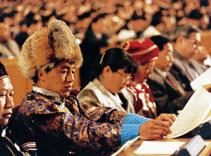|
|
|
POLITICAL
SYSTEM & STATE STRUCTURE
|
|
Cooperation
and Political Consultation
China is a country of many peoples and
many political parties. Before the state adopts important measures
or makes decisions on issues having a bearing on the national
economy and the people??s livelihood, the CPC, as the party in
power, consults with representatives of all ethnic groups, political
parties and non-Party personages, and all other social sectors,
in order to reach a common understanding. This system of multi-party
cooperation and political consultation led by the CPC is a basic
political system in China.Multi-party cooperation and
political consultation take two principal forms: (1) The Chinese
People??s
|

1999??3??5??
?????Э??????
?????????й????????????
??????? ????????????????????
|
| Political
Consultative Conference (CPPCC); (2) consultative conferences and
forums participated in by non-Communist parties and unaffiliated
democrats at the invitation of the CPC Central Committee and local
Party committees. The CPPCC is neither a state organ, nor an ordinary
mass organization. It is a widely representative, patriotic united
front organization of the Chinese people, first established in September
1949. The CPPCC has a national committee and local committees established
in the provinces, autonomous regions, municipalities directly under
the Central Government and counties (cities). The CPPCC consists
of representatives of the CPC, the non-Communist parties, unaffiliated
individuals, people??s organizations, ethnic minorities and other
social strata, compatriots from Taiwan, Hong Kong and Macao, returned
overseas Chinese, and specially invited individuals. The committees
at various levels hold plenary sessions once a year. When the committee
is not in session, special activities for the committee members
are organized, including inspection tours of various localities.
Consultative discussions are held on significant issues relating
to major state policies, important local affairs, the people??s livelihood
and united front work. Democratic supervision is exercised over
the work of state organs and the fulfillment of the Constitution
and laws through the offering of opinions, proposals and criticisms.
When the people??s congresses are convened, CPPCC committee members
are invited to attend and fully air their views. The current chairman
of the CPPCC National Committee is Li Ruihuan. Once a year, the
leaders of the CPC Central Committee invite the leaders of the non-Communist
parties and representatives of
non-Party democrats to meetings for consultation; forums
are held every other month. The former focus on major state policies;
the latter on information exchanges, reception of policy proposals
and discussion of certain special issues |
|



